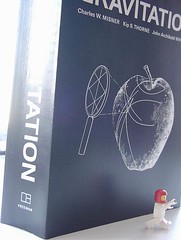October 16, 2009
Serious reading
 Greg Egan comments on a review hatchet job, pointing out something relevant and interesting:
Greg Egan comments on a review hatchet job, pointing out something relevant and interesting:
This leaves me wondering if they've really never encountered a book before that benefits from being read with a pad of paper and a pen beside it, or whether they're just so hung up on the idea that only non-fiction should be accompanied by note-taking and diagram-scribbling that it never even occurred to them to do this. I realise that some people do much of their reading with one hand on a strap in a crowded bus or train carriage, but books simply don't come with a guarantee that they can be properly enjoyed under such conditions.
In fact, many aficionados of "real" literature claim the true pleasure lies in discovering the hidden structures under the surface. So why are not more people taking notes when reading fiction? Greg Egan may be unique in that you would actually benefit from solving equations in parallel with reading, but I would expect many novels would benefit from readers extending their effective working memory. After all, who knows where Captain Yakovlev will turn up later and what he will symbolize?
[ Personally I found Incandescence a mildly interesting read, but it did not grab me. While I agree with Egan that mathematics and the natural sciences are intrinsically interesting and that telling the story of how science develops can be riveting, I don't think I am that much of an orbit guy. Geodesics are much more fun when you bundle them. Give me a novel about neuroscience, causality or topology any day.
...Actually, there is one story about orbits that is truly gripping: Arthur C. Clarke's "Maelstrom II". And it is completely Newtonian! Coming to think of it, Poe's original story was a somewhat dramatized depiction of experimental hydrodynamics. ]
Posted by Anders3 at October 16, 2009 12:33 AM